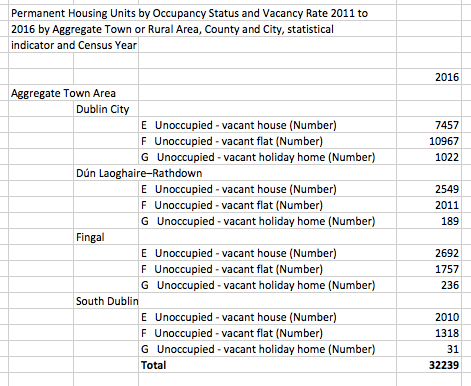Things are pretty bad. Two public servants are moving to Abu Dhabi, so they can afford to buy a home in Dublin. We spend tens of thousands of euros to educate and train people, then they have to go to a tax haven to be able to afford to even live in our country.
We have to provide housing, and quite a lot of it, and fast. We are not building anywhere near enough. The basic problem we face is that when all costs are taken into account, new homes are too expensive to provide without government support. It is cheaper to buy a house (even at high current prices) than to build a house. There are a number of reasons for this and we need to address them for sure.
But we also need to get homes built, starting now. We need to be thinking in terms of hundreds of thousands of new homes over the next few years.
On the sidelines, there is an ideological war going on about house-building. Should the houses be built by the private sector, or by the state? The problem is that nobody at all is building houses at the moment at any scale. It is unaffordable for everybody.
There is one good thing however: the country is awash with young people ready and willing to buy a house, and with a strong economy, many of them are creditworthy and have deposits ready.
Here is what I would do:
Firstly, a straight incentive – €15,000 for every bedroom in a new build completed in accordance with building regulations and occupied by 31 December 2019 in the case of a house and 31 December 2020 in the case of an apartment. (There would also have to be conditions to avoid subsidising houses already underway). The figure would go up to €20,000 where more than 100 units are provided on the same site.
Why €15,000? Well, because for a three-bed semi, that’s enough to cover the shortfall between the price of an existing house and a new house in Dublin. The cost overall for 25,000 homes would be over a billion euros, sure, but all of that would be recovered through VAT and PAYE from the increased economic activity.
Every year after 2019, the amount of the incentive could be reduced if it is no longer required.
Secondly a finance structure is needed. Prospective home purchasers should be encouraged to put down a deposit, now, on their future home. Rather than putting the deposit with the builder, they should place it with a government scheme which would provide a guarantee for the prospective purchaser that their deposit was safe. The government could then loan the value of the deposit to the developer, secured on the land.
The government would also guarantee to purchase the property if the original purchaser ‘fell through’ and didn’t go ahead with the purchase, and if a replacement purchaser couldn’t be found. If it did exercise this option, the government would get a small discount (say 7.5 percent).
But if the economy keeps storming on, that is unlikely to happen. And even if the economy weakens and the government has to buy the houses, the country is still going to need these new homes for the long-term. These will be modern, high-quality houses. The government can rent them for the short term, and rent them later on.
Now the builder has a rock-solid, guaranteed purchaser, rain, hail or shine. With this guarantee, the builder can go to the bank and borrow the money they need to actually build the complex.
This scheme is really designed with private housing built by private developers in mind. But it can work for local authorities too. They can use this funding mechanism to build social housing, or they can use it to build houses for resale.
It can also potentially be used by people who want to buy property to let it, though the structure would need to be tailored to avoid abuse.
Is this the full solution? No. We also need to address the problem of land costs. And to do that, we may ultimately need to replan our transport networks to open up new land. We may need more flexibility in the planning laws. But it provides for immediate action and will mobilise the talent and capital we have available already.
Combined with a plan to utilise vacant housing in the most sought after areas of the country, and perhaps some form of site value tax to incentivise use of vacant or underused land, this would put us well on the way to building hundreds of thousands of homes for our growing population.

